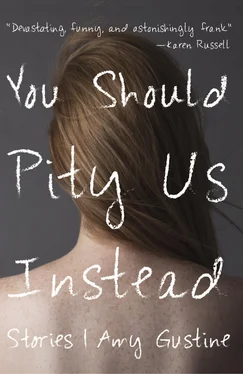“Huh?” She’s looking for something in the fridge.
“The twins, Lawnita and Lawkaya. They went to a family named Miller.”
Lawsandra looks at him as if he wasn’t supposed to know this.
“I looked for ’em on Facebook, but that’s a common name.”
“Lawkaya and Lawnita?”
“Miller.”
His phone rings and Karen leaves a message wanting to know if everything is okay. She’s called Gloria several times at home and didn’t get an answer.
Lawan’s not worried. When he left for work, she was at the table with her Chinese farmer book, the newspaper, and a cup of tea. He’d prepped her dinner and she was going to microwave it whenever she got hungry. Still, he puts on his jacket. As he’s moving toward the door Lawsandra says, “They’re your half-sisters.”
“What?”
“Half. Different father. Yours was named Ron and he died in a house fire. Police tried to say it was a crack thing, but it was electrical. The lights and stuff in that place were always weird, and some of the fixtures there, at the ceiling, they had these black marks, like scorches, around them.”
Lawsandra points to the ceiling, at the hundreds of tiny holes their blinding game has left.
“You know where they are?”
“No. They was so little.”
“What difference does that make?”
“They don’t remember. It’s all up here.” She stabs at her temple. “You make your connections and then they stuck, right? Like you, you come back looking for me because you remember. They don’t, and why confuse ’em now?”
On the way home Karen calls again, says Gloria is still not answering. After that, time gets thick. Lawan pushes through. At Gloria’s he finds the bedroom door shut. She must have gotten herself up here on her bottom. There’s no way she could do the stairs on her feet.
Lawan knocks. “I’m home. You okay?”
Nothing. He raps on the door with all four knuckles. “You all right?”
Silence.
He tries the knob and finds it locked.
“Mom?” The word sounds strange. He repeats it, louder. “Mom?”
Razor blades. Pills. Alcohol. The results flash across his mind in vivid pictures. He pounds on the door, “Mom! It’s Lawan. You answer now!”
Then he hears the toilet flush, the faucet, her walker rattling. She opens the door, registers his expression and laughs. “What’s the matter? Did you think I was dead?” Gloria is almost as tall as he is. She gives him a smacking kiss on the cheek.
“Why didn’t you answer the phone? Karen and I were calling.”
“I was trying to nap. My God, why is everyone so worked up? I can be alone for a few hours.”
As Gloria starts to shuffle past him, Lawan blurts, “Why did you ask me?”
“What?”
“Ask me. Why did you ask me to help you, if you got worse?”
She takes a moment to register his meaning and it passes between them, the recognition that asking him to help her die is possible, but asking Karen, Dennis, or Kevin is not.
“That was stupid. I’m sorry.” They are jammed face to face in the narrow hall. Gloria grips his wrist. “I love you, Lawan.”
“It’s okay,” he says. “I get it. I know how it is.”
She squeezes his arm. “I have your birthday present. It’s downstairs.”
“Come on,” he says. “I’ll carry you.”
Now that Caroline lived alone for the first time in her life, she began to be irritated by the cleanliness of her house. When she left something somewhere, it stayed there. If she didn’t enter a room for days, it collected nothing but a thin, almost imperceptible layer of dust. Her daughters’ bedrooms grew stiff and gray with disuse. In her own bed, Frederick’s pillow remained plump and smooth, the case free of his coarse, white hair, and Caroline — though she knew it was ridiculous — took this as an affront. It unnerved her that nothing changed in the house unless she changed it.
So when the cat meowed, a ridiculous predatory supplicant outside her window in a golden twilight during Indian summer, Caroline did not broom it away as she would have a year ago. With the Depression on, she’d become used to homeless, hungry visitors. She stood at the window looking down at its twisting, black body, its chartreuse eyes, and whispered, “What’s the matter? Are you lost? This isn’t your house. Go on now, go,” aware that her tone was more inviting than dismissing.
The next day, her youngest girl, Eva — who’d inherited too much of her mother even in her mother’s opinion — came by. “There’s a stray cat around the house. Where’s the broom?”
“Leave it be,” Caroline said. “It’s doing no harm.”
The night before, she’d watched the cat lap at the milk she’d slipped out on a tea saucer, marveling at the strange distance between herself and this woman who stood in front of the window. She who would not tolerate a cat’s filthy tongue on her good tea service, especially now that she could no longer replace what might be broken. But this woman, who was using her dishes, her hands, her eyes, had carried the saucer out and watched with amusement and even pride as the animal satisfied itself.
“Where did it come from?” Eva asked.
“Nowhere,” Caroline said. “I don’t think she has a home.”
Eva was Caroline’s plainest daughter. She lacked Sophie’s spunk — however annoying — and Addie’s supple beauty. Sometimes, studying Eva, at once both diffident and haughty, Caroline felt embarrassed, as if she were looking too long in a mirror, and it made her love her youngest daughter with a humiliating ache.
“Everything comes from somewhere,” Eva said. “What you mean is nobody wants it.”
Caroline, then called Karolina, was born in 1880 in Poznań, Poland, a city on the Warta River. As a girl she liked to stand by the river when a thunderstorm was coming in, watching blue sky skitter to gray in the water’s reflection, the mirrored clouds cut in half by waves. In summer the rain felt good on the insides of her wrists, where she rolled up the sleeves of her dress.
The river seemed a majestic, mysterious transport, always on the way to something else, and as she entered adolescence Caroline began to imagine what she might do if she were a boy. She’d escape for sure, maybe as far as America. At the very least she would have used her time down at the river for something useful, like fishing.
But the summer after she turned eighteen, her last summer in Poland, Caroline could no longer look at the river. It had become like her parents — a lonely, menacing thing with a dark, inscrutable surface. And it took a courage she would not have guessed she had, a will that even scared her a little — reminding her as it did of her parents’ steely, stubborn resolve — to board a boat on that same river, a boat which would join a ship that would take her to America.
The cat did not leave, which, given how Caroline fed him, should have been no surprise. Since Black Tuesday not even an animal could afford to abandon a decent meal for the promise of something better down the block.
On Saturday her new son-in-law, Dobry, came to rake the leaves. After Frederick became too ill to work, he used to hire out such tasks to homeless men who walked the neighborhood looking for odd jobs. He’d send them off with a generous wage, Caroline’s kielbasa sandwiches, and a dozen pickled eggs. Now that he was gone, though, Caroline didn’t feel safe hiring strange men and making them meals. This left her with nothing to take care of — unless she counted the cat.
Dobry crouched, sliding his thumb against the tips of his fingers, and made kissing noises to the animal, who trotted up, stopping shy of his reach, and smelled the air appraisingly. Caroline stood at the back door, the screen breaking her face into a thousand tiny diamonds of shadow and light. “I don’t know how to get rid of it. It’s been urinating on my bushes.”
Читать дальше












